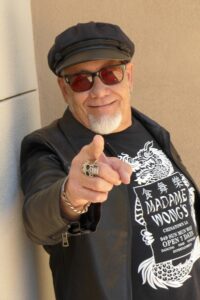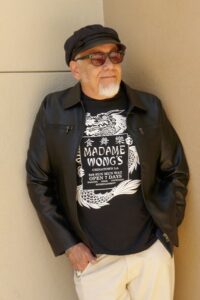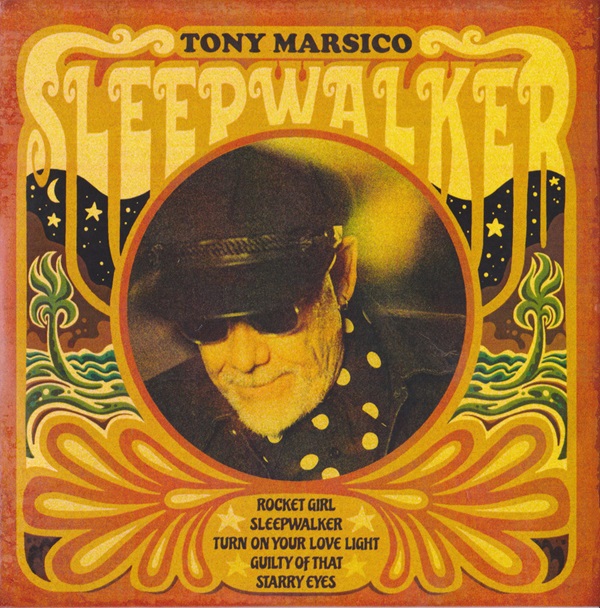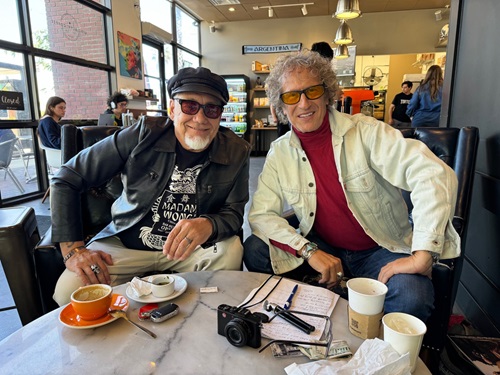By Jimmy Steinfeldt
Sherman Oaks, California (The Hollywood Times) 05/07/2024 – At Tortoni Coffee in Sherman Oaks, I had the opportunity to speak with Tony Marisco. Enjoy our conversation:
Jimmy Steinfeldt (JS): Tony, what was the first album you bought?
Tony Marsico (TM): I was a 45 guy. I grew up at my dad’s pizza parlor and we had a Seeburg jukebox. The guy who serviced the jukebox would replace the 45s every week so I got to hear all the songs. We had the best 45 collection from the 1960s till 1980. When I was young the popular songs were bubble gum and kid’s stuff like “Sugar Sugar” by the Archies. Then I moved more towards The Rolling Stones. We even had some Hendrix on the jukebox.
JS: What was your first bass and amp?
TM: My first bass was an old 60s Epiphone. My brother picked it up for $100 and gave it to me and said, “If you play bass you will always work.” My brother was a working musician. I think my amp was a Kalamazoo. I still have that bass.
JS: I worked for Epiphone for several years hooking up L.A. based artists with instruments. Tony, what’s the first song you wrote?
TM: “Some Kind Of Bad” for my band The Plugz. We played that song for a couple years as The Plugz and we morphed the song into “Rising Sun” which appeared on my next album with my band the Cruzados in 1985. Even before that, around 1983 when we were on the EMI label, we did a recording of it where we brought Bob Dylan in to play harmonica. It’s amazing, the first song I wrote, Dylan played harmonica on a version of it.
JS: Where did you record it?
TM: Cherokee Studios and George Tutko recorded us. We loved recording there.
JS: What musicians influenced you?
TM: As a bass player Duck Dunn was my idol. People who came up from R&B and Blues. Willie Dixon who I got to meet here in L.A. I got invited over to his house. James Jamerson one of the greatest ever. Outside of bassists I always loved Pop and Rock. Anyone from The Young Rascals (that Philly sound) to Hendrix. My favorite was probably The Band which my brother introduced me to.
JS: Tell me about The Plugz.
TM: They put out their first album in the late 1970s. I didn’t get to L.A. until 1980. I was in the band for a couple years. I met the band the way many people found a band to play in. I looked in The Recycler. D.J. Bonebrake of X got his gig the same way. I went over to Tito Larriva’s house right by the Hollywood Bowl and we hit it off right away. Charlie Quintana was in the band. Great drummer, great friend. I’m Italian, and with their Mexican roots from El Paso, we had the same kind of values in music and Rock and roll and family.
JS: How did it become The Cruzados?
TM: We started to write different songs. Not really Punk rock. Cruzados means to cross over. It was Roots Rock and roll. Raging and revved up. Nontraditional Roots. We went to New York to get a fresh start in 1982. We were still being billed as The Plugz and we started playing CBGB and up and down the east coast. Gigs with The Replacements, The Del Fuegos and whoever would have us. We wound up getting a deal out of CBGB. Someone from Arista saw us and we eventually got signed by Clive Davis.
JS: I’m from Minneapolis and photographed The Replacements for years. Then I photographed Paul Westerberg in his early solo career. He used one of my photos for his 14 songs tour t-shirt and poster. What was your band called when you played with Bob Dylan on Late Night with David Letterman?
TM: They kind of called us The Plugz but we were going through our transition. J.J. Holiday was in our band then. He was a great slide player.
JS: Tell the story of how your band got invited to be Dylan’s band on the show?
TM: Charlie Quintana’s girlfriend was working for the management company, and they were looking for a band to be part of Bob’s upcoming music video “Sweetheart Like You.” They brought in Charlie, our drummer, Carla Olson from the Textones and others. They mimed to the track. Later Bob wanted to jam with some younger players up at his house in Malibu. Charlie went first. There were a lot of musicians up there and Charlie hadn’t yet asked me to come along. Finally, Charlie asked me to join him at a Dylan jam session. Bob saw that Charlie and I were tight. We had put in a lot of time playing together so we were locked as a rhythm section.
 We were invited to come back many times. We never practiced or rehearsed songs. It was just a jam. One day Bob walked into his band house in Malibu and said “Have you guys ever heard of this show called David Letterman?” The show was new then but already hip and popular. We loved that show but I don’t think Dylan knew what it was about. Bob said, “You guys want to go to New York and play on it?” I thought this was insane. He didn’t even know if we’d been on TV before. Later he asked if we’d been on TV. We said, yeh, on like a local show but not in front of millions of people on network TV. But he took a chance on a couple of local punks. I’m thankful he did. Kinda changed my life in a lot of ways.
We were invited to come back many times. We never practiced or rehearsed songs. It was just a jam. One day Bob walked into his band house in Malibu and said “Have you guys ever heard of this show called David Letterman?” The show was new then but already hip and popular. We loved that show but I don’t think Dylan knew what it was about. Bob said, “You guys want to go to New York and play on it?” I thought this was insane. He didn’t even know if we’d been on TV before. Later he asked if we’d been on TV. We said, yeh, on like a local show but not in front of millions of people on network TV. But he took a chance on a couple of local punks. I’m thankful he did. Kinda changed my life in a lot of ways.
JS: You guys were great. You played right through when he grabbed the wrong harmonica.
TM: Just follow the singer. That’s what we knew. We were flying by the seat of our pants. We didn’t know what songs we were going to do. Bill Graham was with us for the show. He was Dylan’s manager at the time. We went on stage not knowing what songs we were going to do. Bill said, “Nope, Bob’s not telling anyone.” We had no rehearsal. We walked on stage for the first song figuring out that we are going to do one of Bob’s songs. Bob turns to us and says, “Sonny Boy (Williamson) in E.” Later, we did two of his songs. It was loosey goosey with no prep. That’s how he flies. It was kinda cool in a way. It keeps it ragged and loose. Some people love that performance, and some hate it.
JS: I’m in the love it column. I’ve watched it many times. Moving on to a short list of the many artists you’ve worked with. Matthew Sweet, Neil Young, Roger Daltrey, Linda Ronstadt, Marianne Faithful, Willie Nelson, and my friends Carla Olson and Barry Goldberg.
TM: When the Cruzados broke up I wasn’t looking to be a session man. I loved being in a band. I’m a band guy. But soon after the band broke up and I was out of work. John Doe from X is doing his solo record and asks, “Do you wanna do my record and go on tour?” Then the phone starts ringing. Neil Young, “Wanna come up to the farm?” Then a call from Roger Daltrey to do a mini tour. Also, I was doing some TV shows. The Linda Ronstadt connection was through Joe Ely. They recorded a single together as a duet with Jim Keltner on drums and me on bass. I did a great European tour with Marianne Faithful in the early 2000s. I could do a ten-hour interview on that. She was totally out of her mind as I like rock stars to be. Carla Olson and I have been friends since The Textones. I’ve played on her sessions for years, I love Carla. She produced my first solo album last year. Barry Goldberg has been hiring me on sessions since the 80s. I’ve been on a million of his sessions including Gerry Goffin. I also did Barry’s solo record. Of course I played with Matthew Sweet for 13 years.
JS: Tell me about the Martini Kings.
 TM: It’s been my side band since 1981. I formed it with my brother who was a total jazz cat. A child virtuoso on drums and vibes. When I moved to L.A. we put it together. Originally called the Hoagie Kings. My father and uncle were the Hoagie Kings out of Philadelphia. We made our living selling Hoagies. Martini was a bit more appealing for a band name though. A lot of the players in the band have gone on to great things like playing with Rod Stewart and the Eurythmics. The goal with this band was not to pitch it to anyone but just to have fun. I’ve now put out 27 Martini Kings albums over the last 40 years. There’s been no pressure and as it turns out people have used our stuff in movies and TV.
TM: It’s been my side band since 1981. I formed it with my brother who was a total jazz cat. A child virtuoso on drums and vibes. When I moved to L.A. we put it together. Originally called the Hoagie Kings. My father and uncle were the Hoagie Kings out of Philadelphia. We made our living selling Hoagies. Martini was a bit more appealing for a band name though. A lot of the players in the band have gone on to great things like playing with Rod Stewart and the Eurythmics. The goal with this band was not to pitch it to anyone but just to have fun. I’ve now put out 27 Martini Kings albums over the last 40 years. There’s been no pressure and as it turns out people have used our stuff in movies and TV.
JS: Tell me about your solo album.
TM: I have Pop and Rock in me. I asked my friend Carla Olson if she would produce a single for me and we tracked a song called “Sleep Walker” the title track of my album. It came out a year ago and Little Steven has been playing it on Sirius XM. I’ve just done five new songs and those will come out soon. I call the new project Tony Marsico and the Ugly Things.
JS: Tell me about the film Session Man.
TM: Years ago, Waddy Wachtel called me and said he and Chad Smith from the Red Hot Chili Peppers want to cut a song as a trio for a short film called Session Man. At first, I thought these little movies about session players never go anywhere but it’s Waddy and he produced the Cruzados at one point and we worked together and I love his playing. The movie came out and won the academy award for best short film.
JS: Tell us about your acting career.
TM: I’ve been called to be the bass player in lots of movies. Basically, just playing myself. Roadhouse. Georgia with John C. Reilly and Jennifer Jason Leigh.
JS: What about your experience as an author?
TM: It’s been a fun outlet for me. I’ve been interviewed a lot about performing with Bob Dylan. I’ve told the story so many times I decided to write a little book about it. Late Nights With Bob Dylan. I will tell you about my growing up as a pizza maker kid, Philly area kid never expecting to really rise in my profession. Next thing you know things took off for me and my brother because we loved what we did. I had so much fun writing the book I decided to do another which I call I’m Just Here For The Gig. It’s anecdotes from the last 40 years. A lot of it is about everything that can go wrong. I’ve done gigs from small places like Al’s Bar in downtown L.A. to the Royal Albert Hall. I like playing at both places. These stories give me a chuckle. Those are the gigs I remember. I’ve also done a book with my soon to be wife Janelle Frese. The King of Adalusia. That’s the town where our pizza place was. Tony and Pete’s Hoagie Hut. But it talks a lot about music being in our family. From my brother Frankie the Jazz drummer, who got a full scholarship to music school, to our uncle who played in Be-Bop bands.
JS: What advice would you have for a young person who wants to pursue a career in music?
TM: It’s ok to chase your dream like on the big TV talent shows but you must do it for the right reasons. You must really love music and want that to be your life and career. If you end up just playing to five people that’s good too. You are learning your craft. You’re having fun and people are enjoying you. If you are doing it to be rich and famous, you might as well try another job. You’ll probably make more money at another job anyway. Also, you have to practice. Nothing’s free and easy in the music business. Go play with your axe at home in your bedroom. Woodshed. That’s what we did as kids. Don’t come out prematurely. Get good at it. Then you can come out and rule the world.
JS: What’s next?
TM: Recording and writing a bunch of original songs. The plan for next year is to release my next solo album and tour Europe. I love playing in Europe. And of course, more gigs with The Martini Kings!






